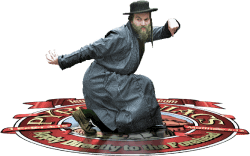
 y fascination with Elijah goes back to my college years. My freshman year at Moody Bible Institute, Moody Press released a very thin but potent book by Howard Hendricks on Elijah, drawn from Hendricks's messages at Founders Week the year before. I loved Hendricks and loved his book.
y fascination with Elijah goes back to my college years. My freshman year at Moody Bible Institute, Moody Press released a very thin but potent book by Howard Hendricks on Elijah, drawn from Hendricks's messages at Founders Week the year before. I loved Hendricks and loved his book.Then a year or two after that, the Moody Church Choir did a performance of Mendelssohn's oratorio Elijah, and that blew me away. Believe it or not, Mendelssohn made me notice several things about Elijah I never thought about before. I became captivated with the prophet's life and ministry.
 So I've decided to add several more posts to the series I already did about Elijah at Cherith and Zarephath. I think Elijah would have made a wonderful PyroManiac, by the way—and I'm not referring to the times he called fire out of heaven. I'm talking about his passion and his willingness to stand against religious fads.
So I've decided to add several more posts to the series I already did about Elijah at Cherith and Zarephath. I think Elijah would have made a wonderful PyroManiac, by the way—and I'm not referring to the times he called fire out of heaven. I'm talking about his passion and his willingness to stand against religious fads.But we'll get to that. This time, let's back up a little bit and take note of Elijah's first appearance on the pages of the Old Testament text.
He just shows up suddenly in 1 Kings 17 without any prelude or introduction. He appears out of nowhere like Melchizedek, without any lineage, without any explanation of his background, and without any account of how he was called or what qualified him for the task he was given.
His appearance is as unexpected as it is abrupt. He arrives on the scene at a time when we might least expect to see a great prophet in Israel— during a time that was arguably Israel's worst apostasy ever.
It was as if the divine Author of Scripture deliberately wanted to surprise us with the appearance of this man. Without any warning or prologue whatsoever, Elijah stands dead center in the narrative, and dead center in Ahab's court, delivering an ultimatum. Matthew Henry says it is as if Elijah dropped from the sky like an angel. But he is no angel. He is every bit a man—and in some ways he might even seem like the most unlikely man for the task God gave him to do.
 Elijah was both an ordinary and an extraordinary man. The apostle James stresses his ordinariness in James 5:17: "Elijah was a man subject to like passions as we are." He was a first of all a fallen man, with the same sinful passions you and I struggle with daily. He was also a common man, without any unusual credentials or special status. And he was a zealous man, living in a decadent culture (with many similarities to our so-called postmodern culture), and hating the spiritual apathy, false religion, and outright contempt for the truth that so dominated that society.
Elijah was both an ordinary and an extraordinary man. The apostle James stresses his ordinariness in James 5:17: "Elijah was a man subject to like passions as we are." He was a first of all a fallen man, with the same sinful passions you and I struggle with daily. He was also a common man, without any unusual credentials or special status. And he was a zealous man, living in a decadent culture (with many similarities to our so-called postmodern culture), and hating the spiritual apathy, false religion, and outright contempt for the truth that so dominated that society.In fact, I suppose one of the reasons I like Elijah is that he is so easy to identify with. His character flaws are not obscured or papered over in the biblical account of his life. (Scripture never does that. The Holy Spirit always paints people warts and all. Elijah is no exception.) We see him panicky, and angry, and frustrated with God. All of that makes his outstanding courage all the more remarkable. Elijah was a fallible human being, just like you and me.
He was ordinary in other ways, too. He had no special lineage. The fact that his genealogy is omitted in Scripture suggests that he was from an ordinary family rather than a prominent one. Everything we know about his heritage is recorded in verse 1 of 1 Kings 17:1: "And Elijah the Tishbite, who was of the inhabitants of Gilead. . ."
That's all the genealogical information Scripture ever gives us about Elijah, and frankly, what it says is not all that informative. Commentators are not quite sure what the word "Tishbite" means. Most assume it means Elijah was born in a town called Tishbe, or something similar. But there is no reliable record of precisely where Elijah's hometown was. The word Tishbite appears only 6 times in all of Scripture, and always in connection with Elijah. It is found three times in 1 Kings and three times in 2 Kings. Other than Elijah, no one else in Scripture is ever identified as a Tishbite.
It is also commonly assumed that Tishbe was a small village somewhere near Gilead, on the east side of the Jordan, about halfway between the Sea of Galilee and the Dead Sea. But no one really knows for sure. What is clear is that Elijah was a man of humble origins from a region of little significance and a town of no reputation. He was ordinary in every way.

But he did not remain ordinary. By God's transforming grace, Elijah became one of the most extraordinary men of the Old Testament. It is significant, I think, that of all the great men of God we meet in the Old Testament, only two make a personal appearance in the New Testament: Moses and Elijah (Matthew 17:3). That's pretty elite company.
Elijah was the first and in most ways the greatest of all the Old Testament prophets. His life makes a remarkable contrast to virtually everyone else of his era. In one of the most dismal and stubbornly dark periods of Israel's history, when it really did seemed as if no one else was left still faithful to God, Elijah stands out like a shining beacon. He surpasses everyone else in his era for courage, power, and sheer love of the truth.
His successor was Elisha, on whom Elijah's mantle fell. Elisha prayed for a double portion of Elijah's spirit. And it may be significant that if you count the miracles recorded in Scripture, Elisha performed exactly twice as many miracles as Elijah.
But even that does not diminish Elijah's stature. We still remember him as the greater of the two, because he came out of nowhere to be the first in a long line of prophets, all of whom must have looked to him as their role model.
And at the end of his life, as if to signify how truly remarkable this man was, God took him alive to heaven in a flaming chariot. No one in all the Old Testament supersedes him in greatness. In fact, Elijah was so extraordinary that liberal commentators like to treat him as a mythical figure.
But—and this is James's point—there was nothing mythical about Elijah. He was a man subject to like passions as we are. In fact, we could use a whole lot more of his passion.












19 comments:
I saw Mendelssohn's "Elijah" as well. It was amazing to see Scripture honored and exclaimed in such a way.
Thanks for opening up Elijah, Phil. He does thunder onto the scene, doesn't he? First recorded words: "As the LORD, the God of Israel, lives, before whom I stand..." (1 Kings 17:1). What he goes on to say is the product of direct special revelation to which we are not privy. But still, he combines a claim of personal closeness to God, and bold standing on God's revelation, that it would be good for the pastor to be able to emulate analogically.
Elijah's life was fascinating.
Another good book on the topic is Elijah - by Charles Swindoll
Thanks, Phil. I have actually been preaching a series on the life and times of Elijah on Sunday mornings for the last 7 weeks and have enjoyed following your posts. I personally think A.W. Pink's book on 'Elijah' published by Banner of Truth is the best out there, hands down.
Thanks for keeping with Elijah.
Excellent and inspiring! Thanks!
"So sad was the character both of the princes and people of Israel, as described in the foregoing chapter, that one might have expected God would cast off a people that had so cast him off; but, as an evidence to the contrary, never was Israel so blessed with a good prophet as when it was so plagued with a bad king. Never was king so bold to sin as Ahab; never was prophet so bold to reprove and threaten as Elijah"...
Matthew Henry
If you were inclined to write a book about Elijah, I would be inclined to run out and buy it.
I continue to REALLY like this series. Thanks.
Hey. Since you are simply teaching on Elijah, you probably won't get over 1000 comments, (some of them really self-absorbed ones), so don't feel too badly ok.
Mendelssohn's Elijah is awesome.
I like the part in the Bible about what God does when Elijah is feeling sorry for himself in the cave -
1) God provides food and water
2) God shows him his power
3) God asks him a question (more than one)
4) God gives him another important assignment
This is actually a lot like what Jesus does after Peter is discouraged because he denied Jesus. (I never noticed before that Jesus did pretty much the same four things)
Trusting someone with a new or another important assignment is the best way of showing confidence in them AND it's the best way to help them to move on from feeling discouraged and sorry for themselves.
Well, after all, these are the days of Elijah.
That's what the songs says.
In light of Elijah, I keep seeing an imaginary meeting between King Brian McLaren and Phil Johnson. What does Brian say when the two run into each other?
"Have you found me, O my enemy?"
Just kidding.
Phil, your series on Elijah has been a great blessing. The Lord has discipled me greatly through you, especially on the idea of daily sufficient grace. I'm so glad to learn you're going to continue teaching on him.
Of course, someone in the church "just happened" to be preparing to give a series of talks on Elijah a few weeks ago, so I was able to give him a long list of links to your series of posts, which I trust God has made useful to him through the work of the Holy Spirit.
This pastor pointed out to me, by the way, that of all the birds in creation, God used *ravens* to feed Elijah when he's in the wilderness. Ravens, who if they are anything like their corvine cousins crows and magpies, normally scavenge and hoard stuff for themselves; yet God used them to take and give food to someone else. (Speaking of folks from the Transfiguration, he also pointed out that despite striking the rock at Meribah, Moses did in a sense finally see the Promised Land, when he appeared together with Elijah on the mountain.)
Cent, I love that song. It's so catchy. I love Swing Low, Sweet Chariot much more. God even worked through the secular humanistic Jewish Sunday school I went to as a kid...of all the songs the choir sang, I loved Swing Low the most.
Also, every year, during the two Passover meals we held each year, four cups of wine would be drunk, for God's four promises in Exodus 6:6-7 ("I will bring you out..."; "I will deliver you..."; "I will redeem you..."; and "I will take you to be my people"). (The cup that Jesus used to represent the blood of His covenant was the third cup, the Cup of Redemption, or so seems to be the consensus—I'm having trouble finding a scriptural attestation.) Anyhow, there's also a fifth cup that's put out for Elijah and left undrunk, with the door left open for Elijah to enter, based on Malachi 4:5-6, according to which Elijah is expected to return before the day of the Lord (interpreted by the early Christians as John the Baptist's preceding Jesus Christ). I recall we even sang a song asking Elijah to return.
Anyhow, it's been a wonderful series of posts, and I look forward to reading much more on this singular prophet.
Allow me to add my thanks for this Elijah series, Phil. I'ts been a real blessing.
D'oh! Like some kind of rank source critic, I said that Elijah's return was "interpreted by early Christians" as John the Baptist's ministry. Of course, according to Scripture, it was Jesus Himself who taught that John the Baptist's ministry was the promised return of Elijah.
Well Sewing, you can't get much earlier than Jesus himself...
Okay, Phil...here's a proposition. Quit your job working for that MacArthur guy (wink, wink), uproot your family and move to Kansas City to start a church.
Come on! You know you want to ;)
Eli's coming....
Was that Three Dog Night....
A man like us, yeah....
That's one of the interesting things about the mugs of Scripture, their all like us, save One.
I like Samson. But that's a jawbone thing. Still, he was a man like us, blinded by sin yet still beholding the face of God.
Tishbyi might come from a root that means captivity. Like bookends this Elijah is heralding the captivity, the last one the emancipation....
Just a thought
Phil,
Thanks for the shot in the arm, I needed it! I am feeling a bit low with the burdens of ministry tonight and really needed this timely reminder. Thanks for the encouraging word from the Word. This is TeamPyro at its best.
Dan,
Just wanted to let you know that I have shared many of your articles as the "article of the week" on my door.
Cent,
I really enjoyed your writings on "when to leave a church!" Very insightful.
I do not comment too often, but I am a "lurker" that feasts here daily.
Hayden
Great article. If you do write a book you may want to note Elijah was taken to heaven in a whirlwind (2 Kings 2:11) not a flaming chariot of fire.
Post a Comment